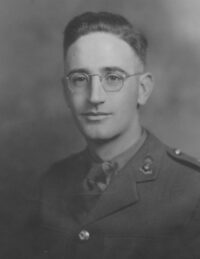John (Jack) Marsden Parker began his working career in 1938 working for the Dominion of Canada Department of Agriculture where he served under Dr. Ellis as part of the team that completed the Soil Survey of Manitoba. After serving overseas in WWII, he was hired in 1946 as the province’s first Soils Specialist with Manitoba Agriculture. He travelled the province identifying soil-related issues and designing on-farm programs to solve them.
In 1954, the Minister of Agriculture established the Soils and Crops Branch and commissioned Jack to direct and supervise soils, crops, forage horticulture, and weed control services being delivered in Manitoba. Jack took it upon himself to organize “Save the Soils” clubs, and he engaged farmers in a variety of demonstrations including crop rotation, permanent grass cover, tree cover, and field shelterbelt programs. As a result, hundreds of miles of field shelterbelts and thousands of acres of fragile and erosion-prone soils were planted with grass and trees. Under Jack’s direction, conservation activities combined with the need for improved municipal water management evolved into the establishment of the first two conservation districts – Turtle Mountain and Whitemud. Today, the conservation district program encompasses most of rural Manitoba.
Jack played an important role in establishing potato and canola industries in Manitoba. His representation and interest in both industries resulted in significant increases in production as well as the establishment of processing plants for both crops.
Throughout his career, Jack served on the Board of Directors of the Canadian Seed Growers Association and was granted a National Honorary Life Membership for his contributions. He was a member of the Agriculture Institute of Canada, the Manitoba Institute of Agrologists, the Manitoba Horticulture Society and the Manitoba Society of Soil Science.
Shortly before Jack served in the Second World War as an artillery officer during the Allied invasion of Europe, he married Kathleen Wesson. They had four children: Kathleen, Mary, John and Nancy. After the war ended, Jack toured throughout Germany and the Netherlands, participating in a report on the state of farmland in the aftermath of the war as well as completing a course on Danish agriculture and co-operatives in Helsingore, Denmark in 1945.
Throughout his life Jack was very involved with his community in various volunteer roles. For his exemplary service to his church, Jack was awarded a life membership in the Vestry of St Albans Church and became a charter member of The Order of St. Albans.


